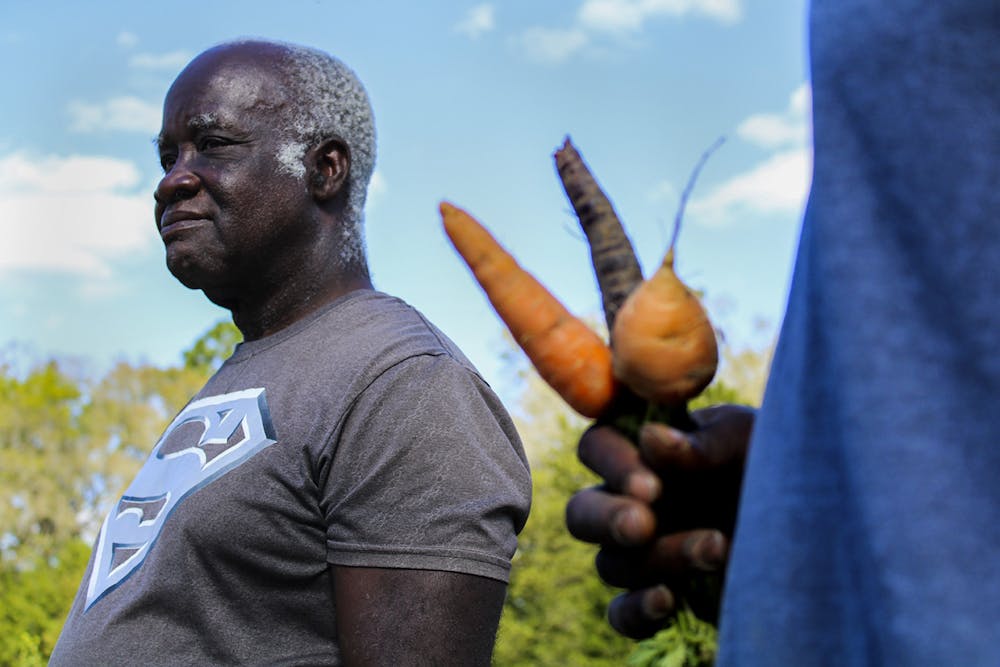Defined lines from years of working outside adorn Lennon Fisher’s face — just like the bountiful rows of fruits and vegetables that decorate his family farm.
“I used to walk out in the fields as a little boy just to see things come up and grow,” he said. “I loved to see it all the time.”
The 59-year-old farmer has spent his whole life on his family’s nearly 20-acre Jonesville farm. His father and the three generations before them have done the same.
Founded in 1939, Fisher Farms, a fifth-generation Black-owned farm, supplies produce to Gainesville, Alachua County and North Florida cities like Jacksonville. The farm, which grows fruit and seasonal veggies, sells its produce weekly at the 441 Alachua County Farmers’ Market and the GNV Market at Heartwood Soundstage.
Fisher’s son, Lennon Fisher Jr., 29, said the farm is also slowly growing its relationship with UF and Working Foods, a non-profit organization that focuses on cultivating local food communities in North Florida. To him, UF is a growing local agricultural powerhouse, and having the support of the university is beneficial for the farm.
But the COVID-19 pandemic created many hardships for farmers across the U.S. Sales dropped for Fisher Farms after farmers markets shuttered, Fisher said. His son took up a second night job at an Olive Garden in Gainesville to help sustain the farm and make ends meet.
Big corporations often take over distribution centers, Fisher Jr. said, which makes it harder for local farms to compete — especially during a pandemic. To help the farm stay in business and support the local agriculture industry, Fisher Jr., set up a GoFundMe page Jan. 21.
Money donated to the fundraiser will go toward a new produce cooler and fencing to keep animals from destroying their crops.
“We're a family that's trying to feed as many people as we can,” he said. “We don't have too much to say. We try to keep it humble.”
The farm was recognized by the National Association for the Advancement of Colored People (NAACP) Environmental and Climate Justice Committee in February 2019. It also received a $5,000 grant from the American Land Trust foundation this year, which will be used to help create fencing around the fields. Every dollar raised through the GoFundMe fundraiser will be doubled by an anonymous investor.
Throughout his time on the farm, Fisher said they’ve faced a number of economic challenges. His parents started selling pieces of the farm’s land 15 years ago. His grandmother used to have trouble selling the peanuts she grew.
“The Black farmers, they couldn't grow as much peanuts because they gave the lots mostly to the whites and less to the Blacks,” Fisher said.
To some, Black farming is reminiscent of slavery, Fisher Jr. said. But this is not the case for his farm. Fisher Jr. said it’s allowed him to find a stable path in life and feel liberated.
He said farming makes him feel grounded, and it helped him focus solely on work when he first started.
However, Fisher Jr. is worried about the future of farming due to the younger generation’s negative perceptions and under-appreciation of it as a profession.
Fisher has worked in the field from sunrise to sunset and has watched his watermelons swell from their vines. The fruit, he said, is his favorite plant to grow.
But as new neighborhood developments take land away from wildlife, Fisher Jr. said there have been problems with animals invading the farm. Turkeys, deer and raccoons have caused recurring issues. He said animals have eaten a whole crop of peanuts three times, which hurt sales.
“The turkeys are collecting a lot of stuff,” he said. “They love greens, like broccoli and cauliflower.”
Xanna Prentice, a 28-year-old market manager for GNV Market, said she has known Fisher Jr. and his family for five years, through working with him at market meetings and the Food Systems Coalition.
“I always thought that was like an impressive thing to not only be a farm in the community but also to be kind of helping have farmers’ voices be heard,” she said.
Prentice said out of 30 total vendor spots at the weekly GNV Heartwood market, about 15 are typically taken by farm vendors. She believes the local farmers market is one of the most hopeful things in the community.
“When you have a farmers market like that, where you have local producers, every dollar has a ripple effect,” she said. “One of the most important community investments that we can make is to support our local farmers and producers.”
Chasity Maynard contributed to this report.
Contact Michelle Holder at mholder@alligator.org. Follow her on Twitter @michellecholder.

Michelle Holder is a second-year journalism student at UF minoring in entrepreneurship and a Metro reporter at The Alligator. She is from Ponte Vedra Beach, Florida. In her free time she enjoys going to coffee shops and reading.






